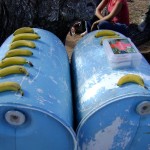by John McLeod
Where would you take students in order to immerse them in the theme of The Ethics of Eating? Where would you go to get students to start asking important questions of how what we eat effects not only our bodies, but also the environment, other people and other nations? As is the case with each new learning expedition that Rio Gallinas Charter School undertakes, the immersion into the expedition theme demands careful planning and creative thinking.
“We looked south to issues of migrant workers, Fair Trade, … displaced agricultural workers, and the increasingly difficult border crossings that so many Central Americans attempt in order to come to this country for work in the food industries,” said 8th grade teacher Corrine Sieser.
For five days, 21 sixth through eighth graders, parents and staff traveled to Agua Prieta, Mexico to experience firsthand some of the ethical issues tied to agriculture that face people living on the border. The experience was modeled on the United World College’s trips to the area where an organization called Frontera de Cristo provides visitors with experiential insights into critical realities facing residents of the sister city near Douglas, Arizona.
Home base was a community center in the heart of a neighborhood on the east side of the city. Families, even those living in homes under construction and with pallets as the main wall structures, still provided several meals for the students. Following the meals, they shared stories of being economically forced off their land where they grew coffee or corn and coming to the border in hopes of finding work in the maquilas (factories) or maybe to gain a rare and precious visa to work across the border. “It was amazing how people in the small homes that looked like they had nothing would give so generously, as though they had everything,” said 7th grader Cisco Cordova.
The border was ever present as the group traveled. Among the places they visited was a recently developed Permaculture Center, a migrant workers’ shelter, a self-supporting drug and rehab
center, and a Fair Trade Coffee Cooperative. One outing took the group deep into the desert with a group called Agua de Vida. Run by members of CRREDE, the Drug and Alcohol Rehab Center, these men refill barrels with water each week to try to prevent deaths due to dehydration of people attempting to enter the USA illegally.
“I thought it was cool that they were more concerned with people living than the illegal migrant worker issue. They just did not want them to die,” said 8th grader Osha Bailey.
They found out that as the border tightened, people have been pushed further into the desert to try to cross into the United States. Students were told that close to four thousand people have died trying to cross the border.
“As I put my arm through the border wall it was no different being in two countries at once and it made me think why people are so against immigration,” mused 8th grader Molly Cudia.
In order to keep families together, there has been an increase in women and children attempting the border crossing. After walking a remote desert trail to the 20-foot metal border, 6th grader Alexis Vigil said, “I think that families should be able to make it across the border freely so they can work like normal people.”
Some of the families interviewed had left their farm lives in southern Mexico to seek jobs in the factories that have grown along the border since the early 1960’s. Such jobs are now increasingly tight as many of the factories have moved south or to other countries where labor is cheaper. Current wages for factory workers are $60-$90 for a full week’s work. One related experience the group had was to purchase and cook a meal based upon a maquila worker salary. Their budget needed to take into account minimal rent, some utilities, and school fees. “It was pretty hard to buy enough food to feed the group. We had to keep putting stuff back,” said 8th grader Eliza McLeod.
The week also brought students to Just Coffee, a Fair Trade cooperative that now supports 58 families in Chiapas, Mexico. By roasting and packaging their own coffee and selling directly to customers, this group has established a business that not only pays the growers higher prices for their coffee beans, but also assures organic growing methods free from toxic pesticides. Proceeds from the sale of the coffee also assist retirement plans for the growers and 10% of profits are returned to the growers’ community to help with infrastructure improvement.
Marisa Romero, 8th grader said, “It was interesting how they roasted the coffee beans. The people who grow the coffee work really hard and they should be rewarded more than they usually are.”
A highlight of the trip was a two hour improvised USA / Mexico soccer match with neighborhood young people. Perhaps ‘match’ was not the right word to describe what turned out to be a mismatch with the USA team struggling to compete with a much more skilled Mexican team. “There’s always next time,” said 6th grader Maricela Lujan.
Hear a radio discussion of the trip (48 min):


